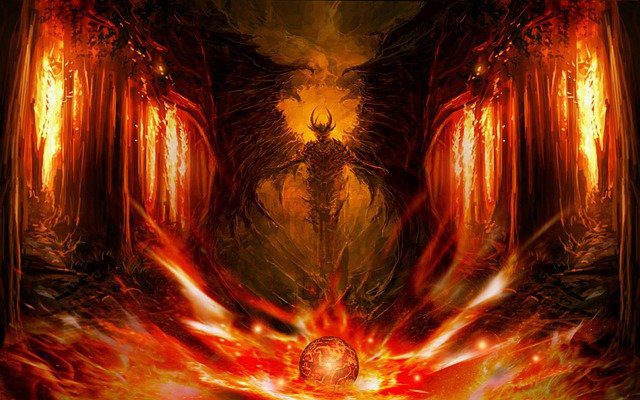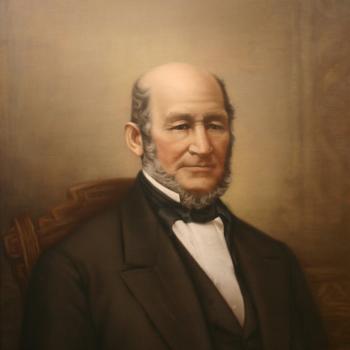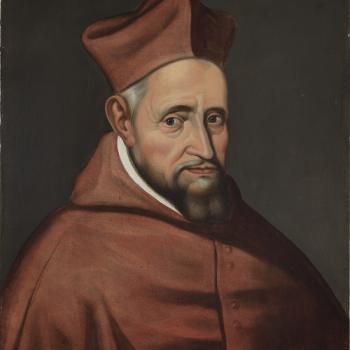
Pope Francis cannot deny the existence of hell without directly contradicting the teaching of the Church. But he can create confusion, and he has done so once again. Did he deny, or at least question, the existence of hell? We don’t know. . . . (Phil Lawler, 3-29-18; italics his own)
Pope Bergoglio has denied the existence of hell for a second time, . . . (Chris Ferrara, 3-29-18)
I have written about this topic several times before:
Lawler vs. Pope Francis #3: The Pope Annihilated Hell? [1-2-18]
Pope Francis, Hell, Phil Lawler, Lies, Damned Lies, . . . [3-30-18]
Satan Referenced 24 Times in Gaudete et Exsultate [4-9-18]
Taylor Marshall’s Whopper: Pope Francis Denies Hellfire? [6-7-19]
Presently, I will collect together all of the statements I can find (the ones that Lawler and Ferrara somehow missed or decided not to look for at all) that Pope Francis has made, affirming the traditional Catholic and biblical doctrines of hell, the existence of Satan, and of demons and demon possession.
The interesting thing is that when I went to search the word “hell” on “The Holy See” website search, it came up 54 times for Pope Francis, compared to 31 for Pope St. John Paul II, and 28 for Pope Benedict XVI. Likewise, “Satan” yielded the results of 78 for Pope Francis, 55 for Pope St. John Paul II, and 30 for Pope Benedict. “Devil” is even more lopsided: 247, 53, and 36, respectively, for the three popes. I won’t document all those usages!
In searching “evil” St. John Paul II had the most, with 971, followed by Pope Francis with 755, and Pope Benedict, 515. But remember, Pope John Paul the Great reigned for about 27 years, more than three times the amount of time Pope Francis has reigned, up till now, so the latter has used the word more than twice as often (about 94 times a year compared to 44). Pope Francis also “wins” by far in a search of “demon”: with 79 appearances, compared to 23 for Pope Benedict, and 21 for Pope St. John Paul II.
Grand Total
(hell / Satan / devil / evil / demon)
Pope Francis: 1213 (roughly 152 times/year; every 2.4 days)
Pope St. John Paul II: 1131 (42/year)
Pope Benedict XVI: 632 (79/year)
All bolding and color highlighting are my own. What follows are his words unless indicated otherwise.
*****
We too have thorns of Satan that hurt us, that impede our progress and very often discourage us. Let us prepare ourselves for the spiritual combat: evangelization asks true courage of us partly because this inner fight, this battle in our hearts, so speak with prayer, with mortification, with the desire to follow Jesus, with the sacraments that are an encounter with Jesus, that are speaking to Jesus: thank you, thank you for your grace. (6-17-13)
[T]he demon is shrewd: he is never cast out forever, this will only happen on the last day. (10-11-13; four more uses also)
Even the demonic powers, which are hostile to man, stand powerless before the intimate union of love that exists between Jesus and whoever receives him in faith. (11-4-13)
[W]e can recite the Creed theoretically even without faith, and there are many people who do so! Even the demons! . . . the demons know very well what the Creed says and they know it is the truth. The Apostle says that ‘they tremble’, because they know that it is the truth . . . [demons] know the whole of theology, they have Denzinger memorized, but they do not have faith. Having faith is not a matter of having knowledge: having faith means receiving God’s message brought to us by Jesus Christ, living it out and carrying it forward. (2-21-14; “demons” appear twice more)
[L]et us renounce Satan and all his works and seductions — for he is a seducer — in order to follow the path of God and arrive at Easter in the joy of the Spirit (3-9-14; in the same Angelus he makes seven more references)
And I feel that I cannot conclude without saying a word to the absent bosses today, to those absent but central figures: the men and women of the mafia. Please, change your lives, convert, stop, cease to do evil! We are praying for you. Convert, I ask it on my knees; it is for your own good. This life you are living now, it won’t bring you pleasure, it won’t give you joy, it won’t bring you happiness. The power, the money, that you possess now from so many dirty transactions, from so many mafia crimes, is blood-stained money, it is power soaked in blood, and you cannot take it with you to the next life. Convert, there is still time, so that you don’t end up in hell. That is what awaits you if you continue on this path. You had a father and a mother: think of them. Cry a little and convert. (Address, 3-21-14, to about 900 relatives of victims of the Italian mafia, about mobsters)
The devil also exists in the 21st century, and we need to learn from the Gospel how to battle against him. (4-11-14: “The devil exists”; “devil” appears 16 more times, also “spirit of evil” twice)
And by this faith, we renounce Satan and all his machinations; we renounce the idols of money, vanity, pride, power and violence. We Christians don’t want to worship anything and anyone in this world except for Jesus Christ, who is present in the Holy Eucharist. (6-21-14)
He who creates division is actually the envious one, the king of envy, the father of envy: that sower of weeds, Satan. He barges in on the community and creates division, always. (7-28-14)
. . . battle between the Devil and God . . . from the beginning, the Bible tells us about this: Satan’s seduction to destroy. Perhaps out of envy. (9-29-14, “Satan” is mentioned six more times, too)
. . . these demons are so clever . . . (10-10-14; the entire meditation is on the topic of demons)
[W]hat is his pastoral plan? . . . cure, heal, raise, liberate, cast out demons: this is the simple plan. (2-5-15)
And the only One who casts out demons is Jesus. (2-8-15)
[T]heir heart does not belong to the Lord; it belongs to the father of all lies, Satan. (3-3-15)
. . . the history of a people who cannot free itself from that desire that Satan sowed in the first parents: you will become gods”. (6-1-15)
This is our struggle, and therefore today let us ask the Lord that, through the intercession of the Archangel Michael, we may be protected from the snares, the fascination, the seductions of this ancient serpent called Satan. (10-3-15; “Satan” is mentioned twice more)
This love alone is the answer to that yearning for infinite happiness and love that we think we can satisfy with the idols of knowledge, power and riches. Yet the danger always remains that by a constant refusal to open the doors of their hearts to Christ who knocks on them in the poor, the proud, rich and powerful will end up condemning themselves and plunging into the eternal abyss of solitude which is Hell. The pointed words of Abraham apply to them and to all of us: “They have Moses and the prophets; let them hear them” (Lk 16:29). (annual Lenten message, written on 4 October 2015)
[F]irst he is aware of the evil spirit that is inside, that it is the devil who torments and commands him . . . in the second case the evil one is hidden, he comes with his very polite friends, knocks on the door, asks permission, enters and lives with that man, in his daily life, and little by little gives him instructions . . . the man ends up destroyed by the well-mannered method the devil uses, by the way the devil convinces him to do things, with relativism . . . (10-9-15; “evil one” appears twice more)
Even when the powers of Hell are unleashed, Christians must rise to the summons, their heads held high, and be ready to brave blows in this battle over which God will have the last word. And that word will be one of love and peace! (11-29-15)
They are the habitual attitudes of Jesus in relation to the multitude of needy people that approached him every day: the sick of every kind, public sinners, the demon-possessed, the marginalized, the poor, foreigners…. And, curiously, in our throwaway culture, they are rejected, they are left aside. They don’t count. It’s curious… What does this mean? That the throwaway culture is not of Jesus, it’s not Christian. (11-19-15)
I would like to encourage you today to pray for us bishops: because we too are sinners, we too have weaknesses, we too run the risk Judas had: he too was chosen as a pillar” . . . we too run the risk of not praying, of doing something other than proclaiming the Gospel and driving out demons. (1-22-16)
[Sin] . . . is the work of Satan, and Jesus defeats Satan . . . (3-14-16; “Satan” appears once more)
Ordinary people – sinners, the infirm and those possessed by demons – are immediately raised up by the Lord. (6-2-16)
[K]illing in the name of God is satanic. (9-23-16; “satanic” is mentioned three more times and “Satan”twice)
One can respond to the demon’s assaults only with the works of God which are forgiveness, love and respect for neighbour, even if he or she is different. (9-24-16)
I remember as a child, when we went to catechism we were taught four things: death, judgment, hell or glory. After the judgment there is this possibility. ‘But Father, this is to frighten us…’ ‘No, this is the truth because if you do not take care of your heart, because the Lord is with you and (if) you always live estranged from the Lord, perhaps there is the danger, the danger of continuing to live estranged in this way from the Lord for eternity.’ And this is a terrible thing! (homily on 11-22-16)
And the empire of vanity and pride will fall, as Satan fell, it will fall. (11-24-16)
Through this three-fold temptation, Satan wants to divert Jesus from the way of obedience and humiliation — because he knows that in this way, on this path, evil will be conquered — and to lead Him down the false shortcut to success and glory. But the devil’s poisonous arrows are “blocked” by Jesus with the shield of God’s Word (vv. 4, 10), which expresses the will of the Father. . . . During the 40 days of Lent, as Christians we are invited to follow in Jesus’ footsteps and face the spiritual battle with the Evil One with the strength of the Word of God. Not with our words: they are worthless. The Word of God: this has the strength to defeat Satan. For this reason, it is important to be familiar with the Bible: read it often, meditate on it, assimilate it. (3-5-17; “Satan” is mentioned once more)
[The Blessed Virgin Mary] foresaw and warned us of the risk of hell where a godless life that profanes Him in his creatures will lead. (in Fatima, Portugal, on 13 May 2017 to canonize Francisco and Jacinta Marto on the 100th anniversary of the first of six Marian apparitions there)
[A] Church without martyrs creates doubt; a Church which does not risk creates doubt; a Church which is afraid to proclaim Jesus Christ and to cast out demons, idols, the other lord, which is money, is not the Church of Jesus. (5-23-17)
But if that poor man has fallen victim to Satan, do you want to crush him too? (5-27-17)
But Jesus’ attitude is different. From the beginning of his ministry in Galilee, he approaches lepers, the demon-possessed, all the sick and the marginalized. (8-9-17)
This way is different from forceful demonic possession; this is more of a ‘parlour’ demonic possession, let’s say . . . it is what the devil does slowly in our lives in order to change the criteria, to lead us to worldliness: he camouflages himself in our manner of behaviour and it is difficult for us to realize it . . . that man, liberated from a demon, becomes a wicked man, a man oppressed by worldliness . . . when the demon enters so gently, politely, and takes possession of our attitudes, our values shift from service to God towards worldliness. (10-13-17; “demon” or suchlike appears 14 more times)
In his description of hell, Dante Alighieri pictures the devil seated on a throne of ice, . . . (11-1-17)
In the Synagogue of Capernaum, there is a man who is possessed by an unclean spirit which manifests itself by shouting these words: “What have you to do with us Jesus of Nazareth? Have you come to destroy us? I know who you are, the Holy One of God” (24). The devil tells the truth: Jesus came to destroy the devil, to ruin the demon, to defeat him. This unclean spirit knows the power of God and he also proclaims his holiness. Jesus rebukes him saying: “Be silent, and come out of him!” (v. 25). These few words from Jesus are enough to obtain victory over Satan, who comes out of that man “convulsing him and crying out in a loud voice”, the Gospel says (v. 26). (1-28-18)
160. We will not admit the existence of the devil if we insist on regarding life by empirical standards alone, without a supernatural understanding. It is precisely the conviction that this malign power is present in our midst that enables us to understand how evil can at times have so much destructive force. True enough, the biblical authors had limited conceptual resources for expressing certain realities, and in Jesus’ time epilepsy, for example, could easily be confused with demonic possession. Yet this should not lead us to an oversimplification that would conclude that all the cases related in the Gospel had to do with psychological disorders and hence that the devil does not exist or is not at work. He is present in the very first pages of the Scriptures, which end with God’s victory over the devil. Indeed, in leaving us the Our Father, Jesus wanted us to conclude by asking the Father to “deliver us from evil”. That final word does not refer to evil in the abstract; a more exact translation would be “the evil one”. It indicates a personal being who assails us. Jesus taught us to ask daily for deliverance from him, lest his power prevail over us.
161. Hence, we should not think of the devil as a myth, a representation, a symbol, a figure of speech or an idea. This mistake would lead us to let down our guard, to grow careless and end up more vulnerable. (Apostolic Exhortation Gaudete et Exsultate, 3-19-18)
Here we see how the unguarded tongue, set on fire by hell, sets all things ablaze (cf. Jas 3:6). (115) (Apostolic Exhortation Gaudete et Exsultate, 3-19-18)
As the Gospels attest, Jesus himself fought and cast out the demons to manifest the advent of the Kingdom of God (cf. Mt 12:28): his victory over the power of the evil one leaves room for the Lordship of God who brings joy and reconciles with life. (4-25-18)
These words of Saint Augustine urge us to remember the old proverb: “The road to hell is paved with good intentions”. They help us realize that the Tempter, the Great Accuser, is the one who brings division, sows discord, insinuates enmity, persuades God’s children and causes them to doubt. (12-21-18)
[H]atred is the breath of Satan, who does not know how to love. (2-8-19; “satanic” is also mentioned once)
The brutality of this worldwide phenomenon becomes all the more grave and scandalous in the Church, for it is utterly incompatible with her moral authority and ethical credibility. Consecrated persons, chosen by God to guide souls to salvation, let themselves be dominated by their human frailty or sickness and thus become tools of Satan. In abuse, we see the hand of the evil that does not spare even the innocence of children. No explanations suffice for these abuses involving children. We need to recognize with humility and courage that we stand face to face with the mystery of evil, which strikes most violently against the most vulnerable, for they are an image of Jesus. (2-24-19; “Satan” appears once more)
It is interesting to see how Jesus sums up his disciples’ work by speaking of victory over the power of Satan, a power that we, by ourselves, could never overcome, if not in the name of Jesus! (9-8-19)
Today too, Satan breaks into people’s lives to tempt them with his enticing proposals. He mixes his own voice to the many other voices that try to tame our conscience. Messages come to us from many places, inviting us to “allow ourselves to be tempted”, to experience the intoxication of transgression. (3-1-20; “Satan” is mentioned twice more)
This is called hounding: when the demon, who is always behind every type of hounding, seeks to destroy and does not spare any means. The beginning of the Book of Job comes to mind, which is prophetic regarding this. God is satisfied with the way Job lives. The devil says, “Yes, because he has everything. He has no trials! Put him to the test!” (Job 1:1-12; 2:4-6). So, first the devil takes away his goods, and then he takes away his health, and Job never, never distanced himself from God. But the devil, this is what he does: hounding. Always. Behind every form of hounding, the devil is there to destroy God’s work. Behind an argument or an enemy, the devil might be behind it from afar, with the normal temptations. But with this type of wanting to have it in for someone, there is no doubt. The devil is present there. This hounding is quite subtle. Let us think how the devil not only hounded Jesus, but also the persecution of Christians, how he tries most sophisticated means to lead them to apostasy, to distance themselves from God. This is, as we say in everyday conversation, this is diabolic. Yes, diabolic intelligence. (3-27-20)
Thus, from the very beginning, Jesus shows his predilection for people suffering in body and in spirit: it is a predilection of Jesus to draw near to people who suffer both in body and in spirit. It is the Father’s predilection, which he incarnates and manifests with deeds and words. His disciples were eyewitnesses to this; they saw this and then witnessed to it. But Jesus did not want them to be mere spectators of his mission: he involved them; he sent them; he also gave them the power to heal the sick and cast out demons (cf. Mt 10:1; Mk 6:7). And this has continued without interruption in the life of the Church, until today. And this is important. Taking care of the sick of every kind is not an “optional activity” for the Church, no! It is not something extra, no. Taking care of the sick of every kind is an integral part of the Church’s mission, as it was for Jesus. And this mission is to bring God’s tenderness to a suffering humanity. (2-7-21)
After the first phase in which Jesus demonstrates that he speaks and acts with the power of God, it seems that the devil has the upper hand, when the Son of God is rejected, abandoned and finally captured and condemned to death. The devil appears to be the winner. In reality, death itself was the last “desert” to cross in order to definitively defeat Satan and free us all from his power. (2-21-21; “Satan” appears twice more)
***
Photo credit: ParallelVision (12-9-20) [Pixabay / Pixabay License]
***
Summary: I document the crystal-clear views of Pope Francis with regard to the existence of an eternal hell of punishment, and of Satan (the devil / evil one), and demons and demon possession.
***

















